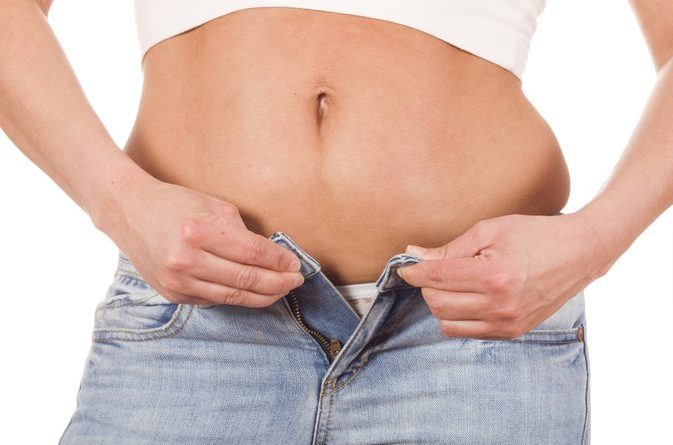How to Get Rid of Abdomen Water Retention
Water retention is a health problem that’s produced because of both circulatory and lymphatic system disorder. Also, this affection is known as edema, it characterizes due to the fluids accumulation on different body tissues.
These fluids accumulation principally affect hands, abdomen, legs, and ankles. As a result, it’ll produce symptoms like itching, pain, and inflammation in those zones. Besides, it can result from different causes such as bad alimentation, hormonal disorders, or even it could be genetic, and many others.
However, how can we get rid of this health problem and get our abdomen looks less inflamed? Keep on reading and you’ll find out how to get rid of abdomen water retention with a list of advice and recommendations.
Include Diuretic Foods in Your Diet
 Consuming diuretic foods is vital if we want to get rid of abdomen water retention. This is because the diuretic effect of some foods aids to eliminate the retained liquids on the abdomen (and other body parts). Similarly, it also aids to reduce some inflammation symptoms and itching on the affected zones, because it increases urine.
Consuming diuretic foods is vital if we want to get rid of abdomen water retention. This is because the diuretic effect of some foods aids to eliminate the retained liquids on the abdomen (and other body parts). Similarly, it also aids to reduce some inflammation symptoms and itching on the affected zones, because it increases urine.
Between the best diuretic foods to reduce abdomen water retention we find the following list:
- Green Tea: it has a huge wealth of antioxidant substances, which gives a powerful diuretic effect to it.
- Watermelon: it is a fruit that compounds of approximately 90% of water which aids to increase urine amounts. So yes, there are many fruits with a diuretic power.
- Orange: highlights its vitamin C content, which aids to detox our body. As a result, renal function will improve.
- Asparagus: As same as the watermelon, it has high water content.
- Artichokes: is one of the most recommendable foods for liquid retention because it has numerous diuretic properties due to their water and minerals content.
- Tomatoes: Is a high antioxidant content food, which aids to get rid of the accumulated liquids.
Other Foods to Fight Abdomen Water Retention
When you include foods with diuretic properties to your diet, you’re doing a great choice. However, it’s recommendable you also include foods with two essential nutrients to treat abdomen and other body parts liquid retention. These nutrients are magnesium and potassium.
Magnesium-Rich Foods
Magnesium is a mineral that helps us reduce abdomen liquid retention because of its anti-inflammatory properties. Thanks to this benefit, magnesium aids to improve some symptoms of this disorder. As a result, some of the symptoms that can be relieved are itching, pain, and bowels inflammation.
Some of the rich magnesium foods are:
- Spinach, it has a high nutritional value, especially when fresh, steamed, frozen, or swiftly boiled
- Quinoa
- Almonds, provide more magnesium than other varieties of nuts. One ounce of dry roasted almonds supplies 80 mg of magnesium. In comparison, 1 oz. of dry roasted cashews give 75 mg, and 1 oz. of dry roasted peanuts supply 50 mg of magnesium.
- Oatmeal, oats have 275 milligrams of magnesium in just 1/2 cup dry rolled oats (1 cup cooked), which is more than a cup of spinach or kale coming in between 24-56 milligrams.
- Linseeds, a 50g portion of linseed have 52% of your daily required intake for magnesium.
- Milk, milk and dairy products are already one of the major dietary sources of magnesium, mostly for children, contributing approximately 10–30% of the total magnesium ingestion.
- Cilantro
Pay Attention!
Milk is one of the magnesium-rich foods. However, it’s full of fats, so if you consume it in excess it won’t give you the results you expect. So, be careful!
Consuming insufficient magnesium has been concerned in a collection of health problems, counting metabolic syndrome, kidney function decline, skeletal muscle loss, and depression.
Reduced ingestion of dietary magnesium is also related to high blood pressure and higher stroke danger, whereas magnesium supplementation has been considered to reduce blood pressure in adults.
Potassium-Rich Foods
 Potassium is a mineral very important to get rid of liquid retention. So, one of the main functions of potassium is to counteract salt and liquids excess in our organism. For this reason, it’s an essential mineral to enhance the diuretic properties of other foods. Some potassium-rich foods are:
Potassium is a mineral very important to get rid of liquid retention. So, one of the main functions of potassium is to counteract salt and liquids excess in our organism. For this reason, it’s an essential mineral to enhance the diuretic properties of other foods. Some potassium-rich foods are:
- Banana
- Garlic
- Nuts and seeds
- Sesame seeds
- Kiwi
- Orange
- Melon
Stay Away from Refined Carbs
Consuming refined carbs guide to fast spikes in blood sugar and insulin levels. Consequently, high insulin levels make your body to keep more sodium by raising the reabsorption of sodium in the kidneys.
As a result, this guides to the more fluid volume inside your body.
Some of the refined carbs consist of processed sugars and grains, such as white flour and table sugar.
Brews to getting Rid of Abdominal Water Retention
 If you improve your diet and include some of the foods we mentioned before, you are in a really good way. Moreover, you can try some of the following natural remedies to get rid of some liquids retained on the abdomen:
If you improve your diet and include some of the foods we mentioned before, you are in a really good way. Moreover, you can try some of the following natural remedies to get rid of some liquids retained on the abdomen:
- Horsetail infusion: this plant is found to be one of the best remedies to fight this problem because it has many diuretic and depurative properties. Besides, it has circulatory benefits which help us activate blood circulation, as a result, renal system issues reduce as well.
- Mint infusion: This plant with its characteristic smell, can also aid to this disorder thanks to its digestive properties. As a result, the inflammation decreases and so the pain too. Besides, it aids to increase biliary secretion on the vesicle.
- Lion tooth infusion: this wild plant has depurative properties. Also, it aids to improve kidney function getting a higher blood cleansing.
- Birch infusion: this herb also has diuretic properties. So, it gets to rid not only of liquids but accumulated fat on bowels as well. For this reason, it’s recommendable for this condition.
Remember to consult a specialist to know how to get rid of abdominal liquid retention. Besides, the specialist will give you some advice according to your needs. He or she could give you some diet recommendations adapted to your needs, exercise examples, and other.
Find more tips in our website



